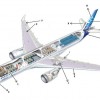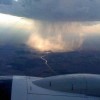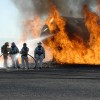Grammar: Simple Past Tense
TOPIC: Grammar Point – Simple Past Tense
GOAL: To review the simple past tense and irregular verbs
Level: Medium
Exercise #1: Read about the structure and use of the simple past tense
The simple past tense is sometimes called the preterite tense. We can use several tenses to talk about the past, but the simple past tense is the one we use most often.
– The structure for positive sentences in the simple past tense is:
subject + main verb (past)
– The structure for negative sentences in the simple past tense is:
subject + auxiliary verb + not + main verb (base form)
– The structure for question sentences in the simple past tense is:
auxiliary verb + subject + main verb (base form)
The auxiliary verb did is not conjugated. It is the same for all persons (I did, you did, he did etc). And the base form and past form do not change. Look at these examples with the main verbs fly, study and review:
| Subject | Auxiliary verb | Main verb | |||
| Affirmative | I | flew | to Paris yesterday. | ||
| Negative | She | did | not | study | the flight manual. |
| Interrogative | Did | you | review | the checklist?. | |
The verb to be is different. We conjugate the verb to be (I was, you were, he/she/it was, we were, they were); and we do not use an auxiliary for negative and question sentences. To make a question, we exchange the subject and verb.
Look at these examples:
| Subject | Main verb | |||
| Affirmative | I, he/she/it
You, we, they |
was
were |
a captain.
late for the flight. |
|
| Negative | I, he/she/it
You, we, they |
was
were |
not
not |
ready for the trip.
happy about the weather forecast. |
| Interrogative | Was
Were |
I, he/she/it
you, we, they |
a first officer? |
Exercise #2: Read about the difference between regular and irregular verbs.
Verbs are an essential part of the English language and we literally have hundreds of them available for our use. However, we you must understand there are two main types of verbs: regular and irregular and each category has its own unique characteristics.
With regular verbs, the rule is simple…
The past simple and past participle always ends in -ed:
- finish – finished – finished
- stop – stopped -stopped
- work -worked -worked
But with irregular verbs, there is no rule…
- Sometimes the verb changes completely: sing -sang -sung
- Sometimes there is “half” a change: buy -bought -bought
- Sometimes there is no change: cut –cut – cut
If in doubt, a good dictionary can tell you if a verb is regular or irregular.
It is wise to review the irregular verbs in detail. There are many of them, so the best method is to memorize them a few at a time.
 Exercise #3: After reviewing the irregular verbs, practice using them in this short exam.
Exercise #3: After reviewing the irregular verbs, practice using them in this short exam.
In the space provided, write the proper form of the irregular verb named in parentheses after the space. Either a simple past or a participle form of the verb will be required. (Don't write more than one word in each space.)
Last week, we _____ (to swim) in the Pacific Ocean, during an overnight trip to Acapulco. During the trip, we visited a site where an old ship had ______ (to sink). We ____(to ride) bikes in the park and Bobby _____(to lead) us to some famous cliffs where we ____ (to dive) off the rocks into the cold water. It ______(to be) late in the season and we ______(to wear) our bathing suits.
We ____(to fly) to Vancouver the next morning. The weather forecast was not good, so we____ (to choose) to fly an alternate route, and_____ (to run) south of an approaching line of thunderstorms. As we ____(to go) around the bad weather, the turbulence ______ (to begin) to increase. After a request, we_____ (to get) clearance to descend to a lower altitude where smoother air was ____(to find). Eventually, we arrived at Vancouver and Bobby commented that his grandchildren had _____(to grow) up there and he hadn't ______(to see) them in a few months. He hadn't _____(to write) to them or ________(to speak) on the phone with them either. After we collected our luggage, he _____(to drive) to their home to surprise them. He _____(to take) his time walking up the driveway, and then he _____(to ring) the doorbell. They _____(to had) a great evening together!

















Recent Comments